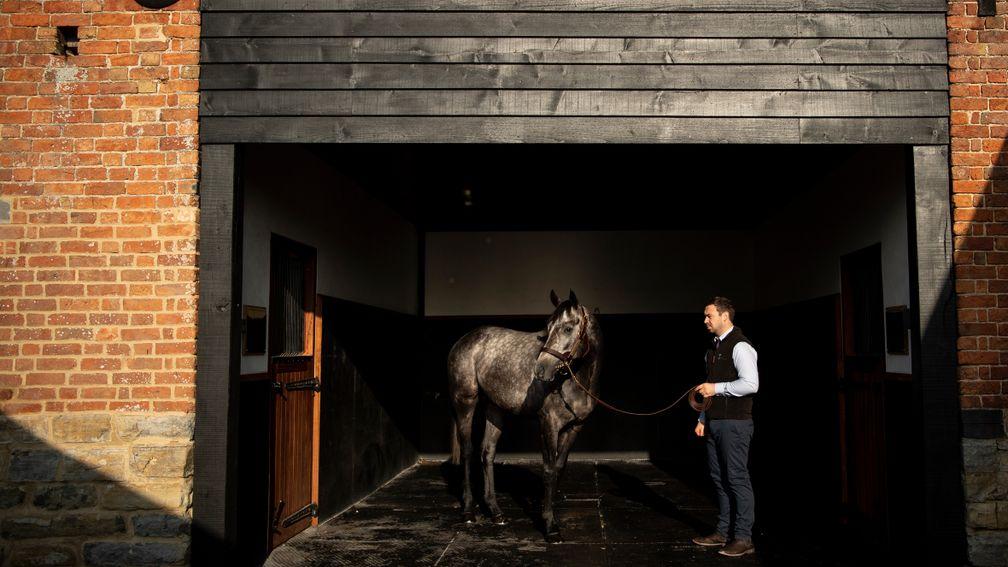Roaring Lion recovering after 'fairly major' second colic surgery
Stallion is receiving treatment at the Cambridge Equine Hospital in New Zealand

Roaring Lion's fightback after suffering from colic has taken a turn for the worse with news he underwent a second surgery at Cambridge Equine Veterinary Hospital in New Zealand on Thursday morning.
Last year's European champion three-year-old, who was due to cover mares during the southern hemisphere season at New Zealand-based Cambridge Stud, had required a first emergency procedure last Saturday.
David Redvers, the owner and manager of Tweenhills, Roaring Lion's British home, has been in New Zealand to monitor the progress of the stallion and offered an encouraging update on Tuesday that he had been reintroduced to food under assessment. However, he had begun to display concerning symptoms again.
"I’m afraid that we had to operate on Roaring Lion again today due to there being a problem with the horse as he was starting to re-colic again," Redvers explained.
"Basically we’ve had to have a fairly major operation whereby he’s had about 25 per cent of his small intestine removed, which obviously compromises him significantly, the poor horse.
"We can just hope that he makes a full recovery. At the moment he has come out of that operation as well as can be expected but we all know that you never want to go in a second time unless you really have to, so we’re back to square one again.
"The next 48 hours are critical. There have been many other horses who have had colic operations and had to go in twice. He’s incredibly tough, this horse, and has the very best team at Cambridge Equine Hospital working on him, so with a bit of luck we’ll keep him going."
Trained by John Gosden, Roaring Lion won four Group 1s for owner Qatar Racing and had finished his first season covering at Tweenhills in Gloucestershire.
What is colic?
Colic is a broad term to describe abdominal pain in horses – a sign of a gastrointestinal problem rather than an actual diagnosis, but while difficult to define concisely it is undoubtedly the leading cause of premature death in domesticated horses. Studies claim 30 per cent of horses between the ages of one and 20 die from it.
It is difficult to treat colic without major abdominal surgical intervention and intensive aftercare to ensure recovery. Horses' gastrointestinal tracts are about 100 feet long if stretched out and their inability to vomit is a problem.
Colic can occur when there is too much gas in a horse's intestinal tract or when something the horse ate cannot pass through its intestines. Inflammation and ulceration are other causes.
Symptoms include a horse refusing to eat its feed, inability to defecate, pawing the ground, lying down, violent rolling, looking at his sides, kicking at his abdomen, sweating, heavy breathing, abdominal distention and a general worried or pained expression.
Read more...
Star search begins as Goffs UK publish Premier Yearling Sale catalogue
Cheveley Park Stakes and 1,000 Guineas heroine Natagora dies at 14
Multiple champion Japanese sire Deep Impact dies aged 17
Published on inNews
Last updated
- Telescope, sire of Supreme Novices' hero Slade Steel, relocates to Foxwood Farm
- Royal Ascot winner Arizona on the move as Coolmore sire joins the exodus to Turkey
- Something different for Burrows as Group 1-winning trainer consigns at the Tattersalls Cheltenham December Sale
- Breeding right to Blue Point sells for €430,000 on Darley winning bid platform
- Classic hero Metropolitan set for strong home support with Etreham busy at the sales
- Telescope, sire of Supreme Novices' hero Slade Steel, relocates to Foxwood Farm
- Royal Ascot winner Arizona on the move as Coolmore sire joins the exodus to Turkey
- Something different for Burrows as Group 1-winning trainer consigns at the Tattersalls Cheltenham December Sale
- Breeding right to Blue Point sells for €430,000 on Darley winning bid platform
- Classic hero Metropolitan set for strong home support with Etreham busy at the sales